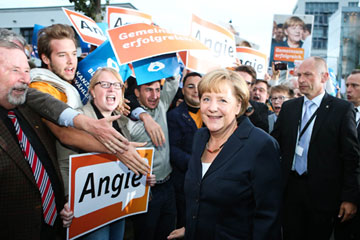
German Chancellor Angela Merkel greets her supporters outside a studio ahead of the TV debate in Berlin, Germany, Sept. 1, 2013.
(3 of 4)
If Merkel is a unifier more than a polarizer, that may be because her life intertwines the strands of a country that was formed as recently as 1871, torn by two world wars and stitched back together less than 23 years ago. At 18, Merkel nearly became a victim of that political turbulence. At the end of each school term, GDR pupils performed cultural programs. In a "snap decision" that Carola Moock, her contemporary at school and now a pediatrician, says arose from boredom rather than a desire to shock, Merkel's class opted to sing "The Internationale," the hymn of the workers' struggle, not in German or Russian but English. The pupils compounded this sign of nascent dissidence by reading a poem containing the phrase "the wall." It wasn't in reference to the fortifications that at the time divided Germany, but it was still enough to trigger a weeklong interrogation of the whole class by the Stasi, the feared secret police. The authorities initially withdrew Merkel's permission to take a degree in physical chemistry. Her father had to work every possible contact to enable his daughter to study.
Slow and Steady
Merkel prefers to avoid speedy decisions, and not just because of her formative tangle with the Stasi. She remains haunted by the Deauville debacle. At a summit at the French seaside resort in 2010, she and France's then President Nicolas Sarkozy made a pact to make investors holding bonds in any country requesting a bailout accept a share of the losses. This was meant to mitigate the burden on the taxpayers funding the bailouts--top of the list, Germans--but instead raised the specter that euro-zone countries might default. The euro plunged into a new spiral of pain.
Deauville marked a rare deviation from the usual Merkel style of decision making. "She goes at it like a physicist," says Dirk Kurbjuweit, a journalist with the weekly Der Spiegel and the author of a Merkel biography. "She wants to solve problems. The bigger the problem, the bigger the chance of a Nobel Prize."
The biggest problem on Merkel's plate is Europe's debt crisis. Amid signs of a recovery in some hard-hit European countries, Merkel continues to resist pressure to mutualize euro-zone debt to reduce borrowing costs for weaker countries and stands by the doctrine of austerity that has seen unemployment spiraling upward in those same countries. "She [has driven] Europe into greater divisions and damaged the European project," says Andrea Nahles, the general secretary of the SPD.
But by waiting until the abyss yawns before taking action, Merkel has succeeded in carrying most of Germany with her when she makes a move. The European policies of the mainstream parties are closely aligned. In Parliament and among voters, there is broad recognition that Germany's export-driven economy is dependent on the survival of the euro zone--never mind that German liabilities to the bailout mechanisms have the country on the hook for as much as $280 billion if the single currency implodes. Any German government will inch toward greater European integration to prevent the disintegration of the euro. And any German government will also find it hard to speed the process or take any significant steps toward surrendering sovereign powers to the E.U.
